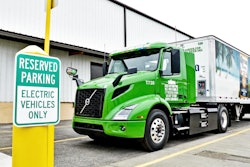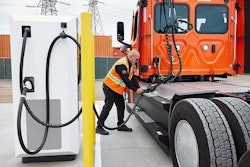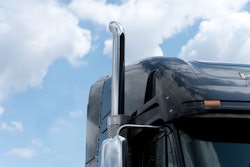The Environmental Protection Agency a couple weeks ago set strict emissions standards for heavy-duty trucks covering model years 2027 through 2032. There’s more than 1,100 pages in the final rule, but the short version is about 25% of new heavy trucks sold in the U.S. need be zero emission by 2032.
GHG 3 isn’t mandating battery-electric trucks. As far as propulsion method goes, the rule is technology agnostic. But it’s unrealistic to expect compliance without wide implementation of battery-electric powertrains. The unique thing about GHG 3 is that it’s not really a rule that fleets will have to comply with, at least not directly. The onus lies on truck manufactures. They have to make and sell set percentages of these trucks so trucking fleets, as the consumer, simply get dragged along for the ride.
Jim Mullen, executive director of the Clean Freight Coalition, said that’s certainly going to influence buying habits and fleet renewal cycles in the years ahead.
Contents of this video
00:00 10-44 intro
00:31 Emissions standards for heavy-duty trucks
01:33 Buying habits and fleet renewal cycles
02:56 Vehicle technology and mandates
06:08 Election year
07:57 Implementation of BEV in commercial trucking
08:58 The trucking industry as micro industries
12:07 Reducing transportations emissions
Jason Cannon:
CCJ's 10-44 is brought to you by Chevron Delo heavy duty diesel engine oil. Now there's even more reasons to choose Delo.
What does the EPA's new greenhouse gas rule mean for your plans to buy new trucks just three model years from right now?
You're watching CCJ's 10-44, a weekly webisode that brings you the latest trucking industry news and updates from the editors of CCJ. Don't forget to subscribe and hit the bell for notifications so you'll never miss an installment of 10-44.
Hey everybody. Welcome back. I'm Jason Cannon, and my co-host, as always, on the other side, is Matt Cole. The Environmental Protection Agency just a couple of weeks ago set strict emission standards for heavy duty trucks covering model years 2027 through 2032. There's more than 1100 pages in that final rule, but the short version is about 25% of heavy duty trucks sold in the US need to be zero emissions by 2032.
Matt Cole:
GHG-3 isn't mandating battery electric trucks. As far as propulsion method goes, the rule is technology-agnostic. But it's unrealistic to expect compliance without wide implementation of battery electric power trains.
Jason Cannon: Now, the unique thing about GHG-3 is that it's not really a rule that fleets will have to comply with, at least not directly. The onus lies on truck manufacturers. They have to make and sell set percentages of these trucks, so trucking fleets as the consumer just get dragged along for the ride. Jim Mullen, executive director of the Clean Freight Coalition, said that's certainly going to influence buying habits and fleet renewal cycles in the years ahead.
Jim Mullen:
The medium and heavy duty doesn't kick in until 2030, which buys the industry more time, so to speak, that wasn't in the proposed rule. So that's a slice of good news, I'd say. It doesn't require that the fleets use them, but it's going to have a couple of effects. Carriers will probably hang on to their equipment longer as 2030, 2031, 2, roll around, which is actually counterproductive to cleaner trucks because they'd be hanging on to their equipment longer. So you'll see fleets expanding the life cycle of their trucks. We saw that back in 2010.
2007, the EPA came out with, at the time, the most stringent knocks in particular matter emission standards, and you saw a huge pre-buy, and still about half of the trucks out there on the road in fleets are pre 2010 engines. And so I think you're going to see the same come 2030. Huge pre-buy which is going to upset the marketplace, and you're going to have older trucks out there on the road. And those trucks, the larger fleets, they'll probably be able to accommodate more easily. But not one is 95% or so of all the trucking companies in the country are less than 10 trucks. So it's rarely going to affect those folks and change their buying habits. And again, at the end game, it's not going to be helpful for the environment.
Matt Cole:
Jim was the acting administrator and chief counsel of the US Department of Transportation's Federal Motor Carrier Safety Administration from 2018 to 2020, so he certainly knows his way around a rulemaking. And he says this one, as written, is a miss.
Jim Mullen:
If I had written it myself, I would've done it the exact opposite. You would let the marketplace actually progress to the position where the technology was ready for adoption, that it had been sufficiently tested in real life conditions. There's less than a thousand battery electric trucks out there today. Hydrogen trucks hardly exist. And yet we're we're imposing, essentially they're mandating that those equipments be used starting in six years. That's backwards. You should make sure that the technology's fully developed, that it's been tested, that it's affordable, that it's sustainable, and at the same time, incentivizing fleets to refresh their trucks, if you will, so that you have cleaner equipment on the road. These prescriptive mandates on unattainable, unachievable timelines really, I don't know if you could go about it in a worse manner. And that's across the board. The OEMs are saying that, the fleets are saying that, the infrastructure grid is not nearly in place to electrify and sustain this transition at this pace, so I'm not sure how you could have done it any worse.
Jason Cannon:
Also of consideration is that we're in an election year and what could potentially happen to this rule if the White House turns over? Jim shares his thoughts after a quick word from 10-44 sponsor, Chevron Lubricants.
Speaker 4:
These past few years have been less than easy. We've encountered challenges we never imagined we'd ever have to deal with. From makeshift home offices and video meetings to global supply chain uncertainty, price instability, market disruptions, and everything in between. Delivering the level of services and products our customers had come to expect was difficult for all of us. We can't change what's behind us, but we can definitely learn from it. We can adapt, evolve, and take steps to reset our thinking, adapt our strategies, and restore your trust in us to better meet your needs, now and in the future. That change begins today. Today we break with convention and introduce a rebalanced line of Delo heavy duty engine oils.
We've reduced our product line from four categories to two. Consolidated and simplified, this lineup removes complexity from the manufacturing processes, enhancing price stability and supply chain reliability so you can trust you'll have the premium products you need to keep your business always moving forward. Our break with convention optimizes the Delo lineup to allow you to provide your customers with the best synthetic blend and synthetic heavy duty engine oils in the market, fully available at prices you can rely on. It's your assurance that you'll be well positioned to be their trusted source for proven engine protection that keeps equipment on the job, giving your customers even more reasons to choose Delo.
Jim Mullen:
If there is a change in the administration, and presuming it's Trump and Biden as the candidates, and if Trump wins, then yeah, I would see there'd be a dramatic shift in the policies and maybe in fact a reversal of what the EPA just did. And you saw that when the Obama administration transitioned to the Trump administration. You saw some rollbacks of a lot of things that President Obama did in the transportation environmental sector, whether it was the CAFE standards from the DOT on MPG requirements, EPA stuff. I know we're talking about the greenhouse gas through EPA rule, but germane to that is what's going to happen in California with the advanced Clean Freight regulations, which is actually directed at the motor carriers, not the manufacturers.
And in order for California to do that, as you probably are aware, the EPA has to grant a waiver. And if there's a change in administration, I would predict with certainty that that waiver would not be granted under the Republican administration. And if the Biden administration, if they get beaten and they advance, they grant the waiver before they leave office, which I suspect that they will, I would expect the Trump administration or the Republican administration to reverse that. This is absolutely a political issue in that regard that it could change course if there's a change in the White House, without a doubt. And again, speaking of elections, if the Republicans retake the Senate and enough seats and maintain the house, you could see some legislation enacted to reverse some of this course as well. So there could be a number of factors which could change the direction that this rule has us headed down.
Matt Cole:
One thing to make clear is that trucking's pushback on GHG-3, and a handful of other zero emissions mandates, isn't the industry saying no to zero emission. It's simply trucking trying to make everyone understand that implementation of battery electric power and commercial trucking isn't going to look anything like what they've seen in the passenger car segment.
Jim Mullen:
Everybody across the entire essential supply chain is saying this is problematic, and EPA stuck to their aggressive timelines, and we'll continue to do what we can to... We'll work with EPA on implementation. There's a final rule, we all get that, but this issue is far from over. Who doesn't want cleaner air? We all want cleaner air. The industry has a good track record of being a good steward of the environment. They've made tremendous progress in the last 30 years. What one truck emitted in the 1980s is now the equivalent of 60 trucks, so it's a 61 ratio. So the industry has done a lot of great work to reduce the negative environmental impact of [inaudible 00:09:06] freight with trucks.
Jason Cannon:
Part of the understanding Jim hopes gets more widespread is that trucking isn't one industry, it's dozens of micro industries. And the equipment needs and duty cycles of each participant don't look the same, and zero emission solutions stand to completely reinvent how most motor carriers do business and how consumers buy goods and what they have to pay for them.
Jim Mullen:
The trucking industry is a very nuanced industry, and what may work for one part of the industry, in other words, let's say port [inaudible 00:09:33] work, where your length of haul might be literally dozens of miles. The technology today, at least by way of range is there. It's there, but you're going to do a couple of things. Your downtime of your equipment is going to increase because you have to charge these trucks more often than you have to fuel them with diesel. You have issues with payload. In other words, you're not able to haul as much freight because of the limits on how heavy a truck can be on our roads. And you look at what it's going to cost to bill out the infrastructure. The Clean Freight Coalition commissioned a study by the Roland Berger firm, which is an international firm, has a great reputation, great experience in this particular space. And they said it's going to be just shy of a trillion dollars to build out the infrastructure to electrify medium and heavy-duty trucks in the nation.
And it's impossible to calculate what that trillion dollar trickle-down effect is going to have on the end price to the consumer. But you'd have to be pretty dense to think that there isn't going to be a trickle-down effect, and this is absolutely going to affect prices of goods sold all across the country. And more importantly, it might actually disrupt the supply chain. Because if you have to have these zero emission trucks that can't go into more than 200 miles and you don't have the infrastructure in place, you're going to see what would look similar to a repeat of COVID , where you didn't have enough goods in the stores because you couldn't get them there. Now, but entirely for a different reason. Not because of the illness and the pandemic, it's because the government imposed rules and a timeframe that couldn't be achieved. So I would say to folks that the industry's trying very hard, they're agnostic to what type of power train is on their truck.
They don't care if it's hydrogen, they don't care if it's diesel, they don't care if it's battery electric, as long as it's affordable and can do the job, and the greener the better. For those who do not know the industry well, folks that have economic incentives for the acceleration of whether it's battery electric trucks or other new technologies that have not yet been fully developed and tested, when they tout when they're going to do, oftentimes folks that don't know any better think it's already been achieved. So my suspicion is if you walked down the street and asked 10 people, "How many battery electric class A trucks..." Well, you couldn't say Class A because they wouldn't know it. "How many big rigs do you think out there running around on the highways and interstates are better electric trucks?" My guess is folks would think it's in the hundreds or thousands, not less than 1000. So I think folks, deceived isn't the right word, but I think folks have been led to believe that this technology is more advanced and prolific than it is, and that further exacerbates the problem with the public at large.
Matt Cole:
It's also problematic, Jim says, that zero emissions isn't being treated as the quest that it really is. There's plenty of opportunity to slash transportation's emissions that he says are simply being overlooked to get to zero as quickly as possible.
Jim Mullen:
There's a tax on new trucks today that's a federal excise tax. That tax was enacted to help fund the first world war, and that's 12 and a half percent on a truck. So if you buy a brand new truck at $200,000 at 12 and a half percent, $25,000 goes straight to the feds. And I talked earlier about those pre-2010 trucks being less clean than current technology. Well, repealed FET and help incentivize buying new trucks. So with half of the country's trucks, approximately half, being pre-2010, the math pencils out. Basically, if you replace all those with new technology today, diesel truck, new technology today, you'd reduce emissions by over 80%, closer to 82%. So there's all types of ways you sometimes get asked, okay, a trillion dollars. Okay, isn't it worth a trillion dollars to have cleaner air? Okay, but there's easier ways to do it, less expensive ways and ways to do it with immediate positive impact versus this greenhouse gas rule. So that's the whole shoot and match, is there's so many different ways to improve the environment that isn't going to put the supply chain and the consumer at risk.
Jason Cannon:
That's it for this week's 10-44. You can read more on CCJdigital.com. While you're there, sign up for our newsletter and stay up to date on the latest in trucking industry news and trends. If you have any questions or feedback, please let us know in the comments below. Don't forget to subscribe and hit the bell for notifications so you can catch us again next week.









